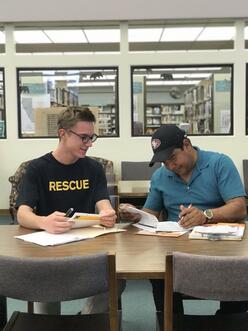On May 1, 2019, after spending five months in an immigration detention center, Enrique and his then 19-year-old son were granted status as political asylees. The two had fled Nicaragua after suffering persecution and abuse from the government as a consequence of providing aid to protestors during the 2018 uprisings against President Daniel Ortega’s social security reforms. “We suffered just for thinking differently,” Enrique said. “Things became really bad when my family got dragged into it. That’s when we left.”
Enrique’s journey to United States has not been without trouble. At one point he witnessed his son be put in handcuffs by border security which was “hard to see as a father.” Even after securing asylum status, Enrique and his son continue to navigate the many obstacles of assimilation, including employment and finances. When Enrique’s lawyer referred him to the IRC Los Angeles, he was able to obtain a work permit and enroll in Financial Coaching sessions. “All this was very new to me and I still think there’s more to learn,” said Enrique. “But the IRC has clarified so much.”

The IRC Los Angeles’ Financial Coaching program offers one-hour one-on-one sessions with volunteers to help clients learn the basics of budgeting, bank accounts, credit building, and other aspects of financial capability. Clients meet with coaches for a total of eight sessions, and are given a $100 gift card at the end. According to Hanré Chang, who has been volunteering as a financial coach for three years, this is helpful as an incentive to clients to complete the full course, which may otherwise seem difficult or intimidating.
Through coaching seven clients, Chang has found his work as a volunteer to be “very fulfilling.” He typically begins his sessions gauging the specific interests of his clients and then goes from there. In Chang’s experience clients tend to have similar concerns -- debt, budgeting, employment -- but Chang’s favorite topic to discuss is credit cards. “I was always interested in how credit cards work because my dad always told me to be scared of them,” said Chang. “But it turns out if you use them responsibly, you’re in good shape. And that’s something I want to share with clients.”
Helping clients become less scared of their finances is at the core of the Financial Coaching curriculum. “The benefit to clients from our financial capability programs lies in empowerment and self-sufficiency,” said Luke Van Lant, Financial Literacy Coordinator of the IRC Los Angeles. “Financial Coaching exists to help clients lock in habits that benefit their financial health in the long run, less to dump information on them about America's financial system.”
After completing his eight sessions, Enrique has now opened a bank account, is planning ahead for retirement, and feels more confident about controlling his savings and expenses. But for all Enrique has gained from Financial Coaching, Chang says he gains as well. “Not only am I able to teach other people things that are valuable, but I’m learning a lot too.”
Author: Isabel Guarco